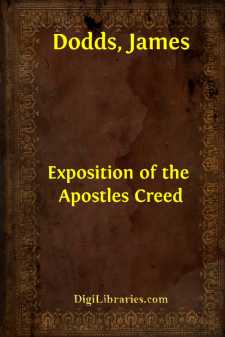Categories
- Antiques & Collectibles 13
- Architecture 36
- Art 48
- Bibles 22
- Biography & Autobiography 813
- Body, Mind & Spirit 142
- Business & Economics 28
- Children's Books 17
- Children's Fiction 14
- Computers 4
- Cooking 94
- Crafts & Hobbies 4
- Drama 346
- Education 46
- Family & Relationships 57
- Fiction 11829
- Games 19
- Gardening 17
- Health & Fitness 34
- History 1377
- House & Home 1
- Humor 147
- Juvenile Fiction 1873
- Juvenile Nonfiction 202
- Language Arts & Disciplines 88
- Law 16
- Literary Collections 686
- Literary Criticism 179
- Mathematics 13
- Medical 41
- Music 40
- Nature 179
- Non-Classifiable 1768
- Performing Arts 7
- Periodicals 1453
- Philosophy 64
- Photography 2
- Poetry 896
- Political Science 203
- Psychology 42
- Reference 154
- Religion 513
- Science 126
- Self-Help 84
- Social Science 81
- Sports & Recreation 34
- Study Aids 3
- Technology & Engineering 59
- Transportation 23
- Travel 463
- True Crime 29
Exposition of the Apostles Creed
by: James Dodds
Categories:
Description:
Excerpt
While the disciples had Jesus with them, there was no occasion for a formal summary of the doctrines which His followers were called to accept and to maintain. He was present to resolve all doubts and settle all difficulties, so that when their faith was assailed or their teaching impugned they could refer to Him. Then, as now, faith had Him for its object,—with this difference, that He was visibly at hand to counsel and to direct, while now He is passed into the heavens and guides His people into all truth, not by personal instruction but by His invisible though ever present Spirit.
Another reason why Jesus gave His disciples no creed may be found in the fact that His work was not finished until He had laid down His life, and that no creed could have been satisfactory which did not cover those great unfulfilled events in His history that lie at the foundation of the Christian religion.
Jesus did indeed require belief in Himself as a condition on which healing and salvation were bestowed. Unbelief hindered His work, while faith in His Messianic claims and mission never failed to secure a rich blessing to those who confessed Him. The faith which He recognised was not the acceptance and confession of a summary of doctrine such as any of the Creeds now existing, but a simple statement of belief in Himself as the Son of God and the Messiah. On one occasion only does He appear to have called for a confession which went further than this, when, having declared to Martha the great doctrine of Resurrection, He put to her the question, "Believest thou this?"
After His death and resurrection, when Jesus charged His disciples to preach the Gospel, He bade them teach their followers to observe all things whatsoever He had commanded them. The Apostles, accordingly, appear to have furnished the leaders of the churches they planted with summaries of doctrine, such as we find in the fifteenth chapter of Paul's first Epistle to the Corinthians. Paul seems to refer to such a summary when he writes to the Romans commending them for obedience to the "form of doctrine" which was delivered them, and when he bestows his benediction on those Galatians who walked according to "this rule." It was, doubtless, such a compendium of doctrine he had in view when he charged Timothy to "keep that which was committed to his trust," contrasting this "deposit" with "profane and vain babblings, and oppositions of science falsely so called." The bearing of this charge is made more emphatic when it is repeated by the Apostle in connection with the exhortation, "Hold fast the form of sound words, which thou hast heard of me, in faith and love which is in Christ Jesus."
It would thus appear that from Apostolic times there existed a form of words of the character of a creed, which, for some reason, came to be jealously guarded and concealed from all who were not Christians. It was perhaps Paul's reference to the summary of doctrine as a "deposit" to be carefully kept, that led the early converts to regard it as a private possession—a trust to be hidden in the heart and covered from unfriendly eyes. The Apostle did not mean that it should be so regarded, but this interpretation given to his words, or some other cause, led to its being used as a watchword rather than as an open confession, the consequence of which is that in the writings of the earliest Christian fathers no statement of doctrines corresponding to a creed is found.
The absence of creeds or of allusions to them in the oldest Christian treatises gives seeming point to the objection urged by Professor Harnack and others against the Apostles' Creed as now held and interpreted by the Church, that it is not a correct summary of early Christian belief....


